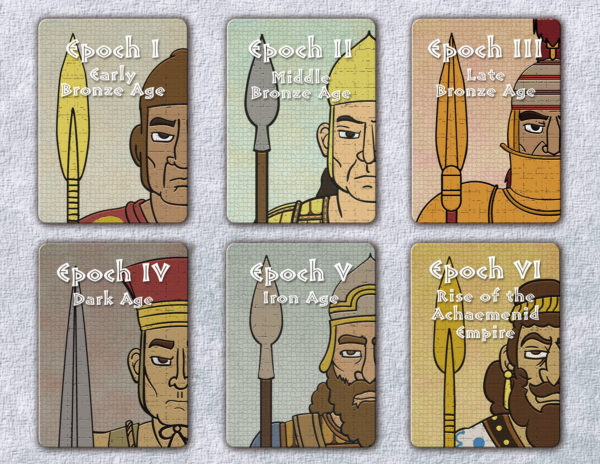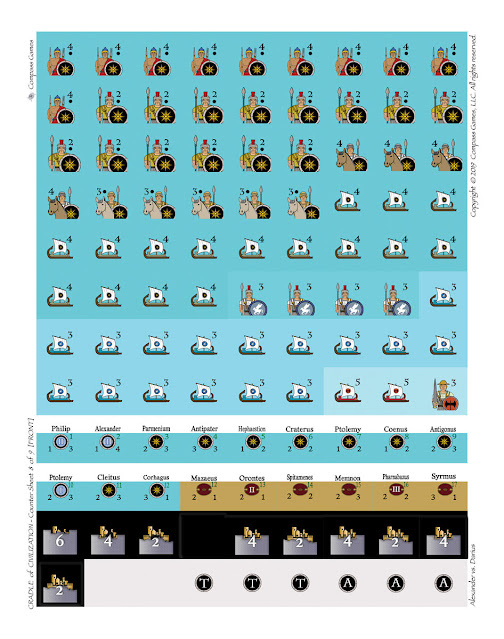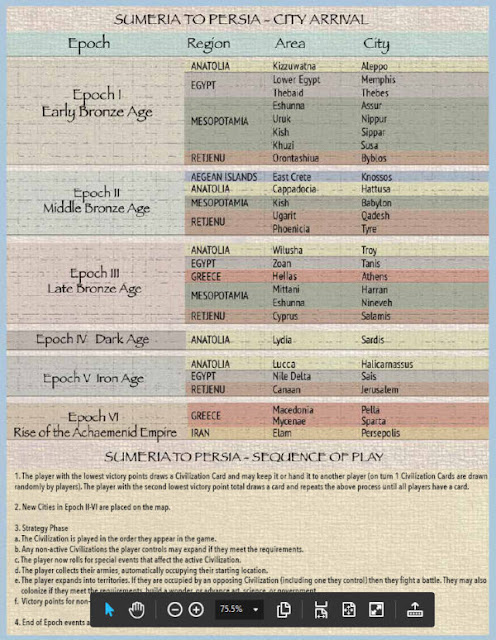"The idea for this game was born out of a moment of gaming frustration. In all my readings and studies on history and
warfare I’ve found at least one historical truth: war is messy and its outcome uncertain. Alexander the Great is always held
in such a certain esteem among military historians for his bravery and daring. He pulled off one of the most ambitious
invasions in history and succeeded. His victory over the Persian empire is stunning in its entirety. Yet, Alexander’s victory
is almost seen as inevitable. Persia is in disarray. Darius lacks military skill and daring. The Phalanx is dominate in the
field. Therein lies a contradiction: How is Alexander’s victory over Persia simultaneously a great military endeavor and
inevitable?
The design of this game was kept simple and accessible in order for it to be picked up quickly. The design of the battles
are also kept simple, but also very bloody in its losses. I wanted a game that was fast enough to make sure almost every
decision you make matters and must be weighed carefully but not too carefully. Playing it too safe will not win you the
game. I hope I have succeeded in doing that and I also hope you enjoy this game.
As Alexander himself said “I am not afraid of an army of lions led by sheep; I am afraid of an army of sheep led by a lion.”

I love, worship, and adore Ancient Wargames, and I have noticed exactly what the designer has. Alexander's Uncle went so far as to say, " I have fought men and Alexander faced women" (when he invaded Italy). However, I still accept the "great men" thesis of history. What happens if it wasn't Darius III on the Persian throne, or if Memnon hadn't died from illness? This is an excellent game to find out. It is also fast paced, so you can try more than one strategy on game night, or even have a few more games. The rules are simple to learn, while still giving you the flavor of the war. You also get to play with the world beating Phalanx, and Persian Cavalry (which if handled correctly could have given Alexander a run for his money). I think it says a lot that Alexander wanted to seem to be a legitimate King of Kings in the Persian Empire's eyes, and not just some barbarian usurper. He adopted almost everything of the Persian customs, and this is what probably got him killed (if not a pickled liver). Alexander vs Darius is fun even playing on the losing side. The Events Table adds a certain doubt in your mind for every move you make. This is the Sequence of Play of the game:
The game is divided into 20 turns. These turns represent
each season over a 5 year period. Each player will take
turns taking certain actions during these turns. The number
of actions you can take will depend upon the amount of
treasure you have to spend.
Phases
1. Generate Treasure
2. Take Actions Until Both Players Pass
3. Supply and Recruitment
4. Spartan Rebellion (Starting turn 3)
5. Maintain Armies and Navies
These are some of the events that you can get on the Event Table die roll:
Crete Aids Alexander
Illyrian Raids
Egypt in Revolt
Persian Court Intrigue
Poris Invades
Scythian Raids
You will have to deal with rules about these and other subjects:
Sieges
Force March
Leaders
Out of Supply Armies
Maintaining Your Forces
Sumeria to Persia is a different game. Here is Mr. Chick again with some designer notes about it:
"Sumeria to Persia is an update of sorts to the mechanics of History of the World, adding rules for wonders, colonization,
and old civilizations still enjoying steady growth. The system, without modification, breaks down a bit with the Neo-Assyrian and Persian Empires. Both were massive. Indeed, Neo-Assyria enjoyed two periods of particularly robust growth,
while Persia all but covered the map by the time the Persians were defeated at Marathon. The answer was to have both
periods of Assyrian growth simulated, while Persia would cover only Cyrus the Great’s conquests. The Persian army is
large, but its growth is erratic, making the choice of Persia a calculated risk. Any player who is behind will want them, but
that is no guarantee of victory."
This is the games sequence of play:
The game is played in six Epochs (or Turns). Each Epoch is
divided into three phases:
1) New Civilization Allocation Phase
2) Strategy Phase
- Player Civilization Rounds
- Player Scoring
3) End of Epoch Phase
Sumeria to Persia was not really the type of game I thought it would be. It does have civilization growth and fall in it. However, it is also a game about conquering territory, which is right up my alley. My favorite part about the game is its sheer scope. I have seen games that had ancient Egypt, Babylon, and Israel in them as playable. have you ever seen a game where you could play the Mitanni? Here is a list of some of the nations/city states that you can play:
Sumer
Elam
Old Kingdom
Akkadian Empire
Minoans
Hittites
Hyksos
Mycenae
Troy
Assyria
Sea People
Urartu
Archaic Greeks
Besides conquering, you also get Victory Points for building a Wonder, colonization, and advancing your culture. To try and build a Wonder you must take one of your armies out of play and challenge the fates with a die roll.
Once again, Compass Games has taken me to a place I never really had interest in before playing this game. Then they didn't just take me there, but ensured I had fun doing so.
Naturally, because of my wargaming bias, I prefer to play Alexander vs Darius. That is not to say that Sumeria to Persia is not a good game. The Epochs that it represents, especially the early ones, I am extremely interested in from a history point of view. How the 'Land of Two Rivers' became so important to the budding world is great stuff. Thank you, Compass Games for allowing me to review both of these games. I was very interested when I found out Sean Chich was one of the designers. I have a good number of his other games, and I felt with him you cannot go wrong, at least so far. On the games' websites below you can read both of the Rulebooks of the games. Peruse the site at your leisure. I have a ton of their games, and am in the queue for a good many more.
Robert
Cradle of Civilization:
Compass Games:
While you are at Compass Games check these two upcoming games:
I am drooling over both of them.











Great review
ReplyDelete